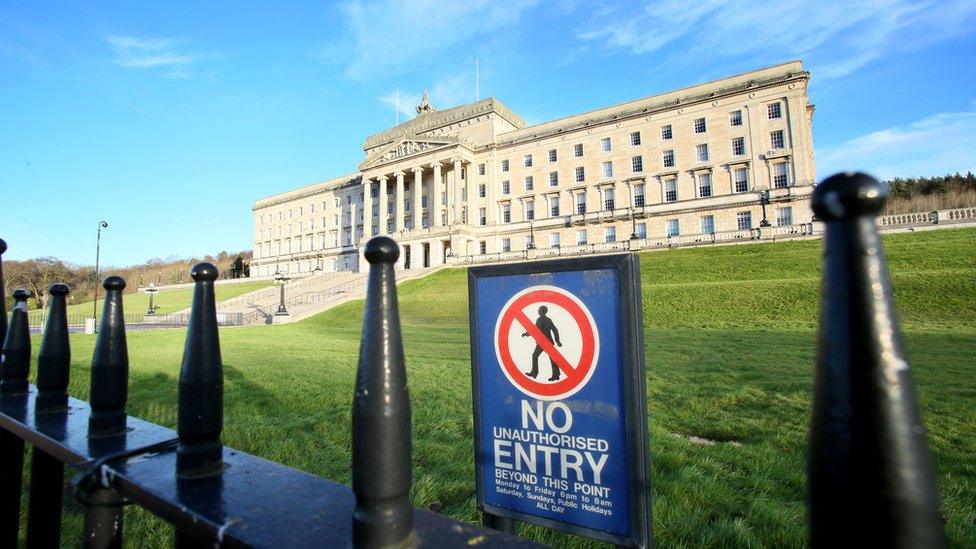DUP backbenchers defy party over bill to give ministers more power
- Published

Eleven Democratic Unionist Party (DUP) assembly members (MLAs) have defied the party by refusing to vote for a controversial piece of Stormont legislation.
Although they abstained, the Executive Committee Functions Bill still passed comfortably. Earlier MLAs clashed over claims the bill overturned safeguards and could allow ministers to make "solo runs" on key decisions.
A senior DUP source said they did not expect any disciplinary action to be taken over the abstentions.
The rebellion came after former DUP adviser Richard Bullick warned the bill effectively removed the DUP's veto over ministers taking decisions the party disagreed with.
He cited the example of Martin McGuinness abolishing the 11-plus exam on his last day in office as education minister in 2002.
Former ministers among rebels
During Tuesday's debate on the bill's final stage, DUP MLA Christopher Stalford - who voted in favour - said his party fully supported the change, which he said would ensure the continuation of "collective government in the spirit of co-operation".
He insisted that under the new provisions: "Ministers will not be able to go off on solo runs."
He said the legislation was "completely consistent with the St Andrews Agreement", which his party helped negotiate.
But former DUP MLA Jim Wells said many backbenchers were extremely concerned and were only voting for it because they had been whipped by the leadership.
Those who abstained from voting included former ministers Mervyn Storey and Michelle McIlveen, with the rebellion a blow to the authority of party leader Arlene Foster,

Ulster Unionist MLA Doug Beattie said the bill would create a "combative executive"
The Executive Committee (Functions) Bill was fast tracked through the assembly before Stormont went into recess on Tuesday.
It seeks to strengthen the power of individual ministers and was introduced after a court judgement two years ago over a waste incinerator raised questions about the way executive decisions were made.
'Far-reaching consequences'
The executive argued that the judgement would have restricted the power of the infrastructure minister to take decisions without the approval of her executive colleagues, which could have major implications for planning applications.
But Ulster Unionist MLA Doug Beattie said the bill would have far-reaching consequences.
He said: "It will create a combative executive and will lead to dysfunctional government."
Mr Beattie argued it would also allow ministers to "step outside collective government".
Accusing the DUP of a U-turn he said: "At St Andrews, they said they fixed the Belfast [Good Friday] Agreement by stopping ministers going on solos runs, yet here they are backtracking on that principle"
DUP Junior Minister Gordon Lyons said the bill "not only protected but enhanced the St Andrews Agreement".

Declan Kearney supported the bill saying it would bring clarity
Defending the need to fast track the bill, Sinn Féin Junior Minister Declan Kearney said it was to allow decisions to be made on key planning applications.
He said the legislation would provide the clarity needed to increase co-operation within Stormont's five-party coalition.
The bill was passed by 58 votes to 13 with 11 abstentions and will now go forward for Royal Assent.
The assembly has been adjourned until 7 September.
- Published28 July 2020

- Published10 April 2019